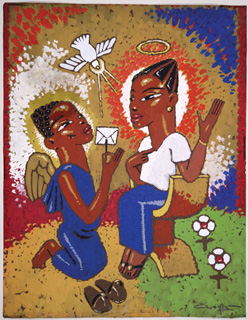Betting on Salvation
For Sunday December 22, 2013
Fourth Sunday in Advent
Lectionary Readings (Revised Common Lectionary, Year A)
Isaiah 7:10–16
Psalm 80:1–7, 17–19
Romans 1:1–7
Matthew 1:18–25
As I review a book a week for Journey with Jesus, I'll often read several books on the same topic. Last summer, for example, I read three books about food, then several books about the Middle East. In October, I read four books about technology.
I live in the Silicon Valley, so the technology books held a special interest for me. All four titles have earned critical praise. And back in 1985 I wrote my dissertation on the French sociologist Jacques Ellul (1912–1994), who wrote an important trilogy about technology.
 |
Annunciation by Nigerian artist Paul Woelfel. |
Ellul insisted that technology is the defining component of modern culture. The subtitle of his book The Technological Society (1954) called technology "the wager of the century." It's a bet that we've made. Now fast-forward to the four books I just read.
Dave Eggers' new novel The Circle has drawn comparisons with Orwell. A new college grad named Mae works at a dystopian tech company called "The Circle" that's led by the "Three Wise Men." It's an environment of enchantment: "My God," Mae thought, as she surveyed the corporate campus, "it’s heaven." The Circle exhibits all the characteristics of a cult, including the near impossibility of opting out. No wonder Eggers has no Facebook or Twitter account.
Then there's Evgeny Morozov's book To Save Everything, Click Here. His subtitle summarizes his thesis: The Folly of Technological Solutionism. Don't believe the hype, says Morozov, for technology can never keep its exaggerated promises.
I especially commend two books by Jaron Lanier, a computer scientist with impeccable geek cred. Thirty years ago Lanier pioneered the invention of virtual reality. In 2010 Time Magazine named him one of the 100 most influential people in the world. The New York Times listed his You Are Not a Gadget as one of the ten best books of 2010.
Lanier says that he used to be a techno-cheerleader in the "merry band of idealists." Today he calls himself a "humanist softie." He's frightened at the Frankenstein he helped to create.
 |
Annunciation to Mary by Thai artist Sawai Chinnawong (2008). |
Lanier contrasts "the lifeless world of pure information" with the rich mystery of being human. He defends human intelligence, judgment, and artistic creativity against the pseudo-wisdom of computer algorithms, search engines, and aggregators. Information technology, he says, is necessarily a form of social engineering, and the results have been horrible — spiritually, morally, and economically.
His new book is called Who Owns the Future? It's about the devastating impact of big data on our economy. A tiny minority have become fabulously rich in the digital economy, while many millions more have been displaced.
So what does this techno-talk have to do with Christmas? As it turns out, a lot. As Ellul saw sixty years ago, and as these four books concur, technology has become our Salvation Narrative. I use capitals because the zeal and hubris of our technologists is limitless, as is their disdain for anyone who disagrees with them. But the Ellulian wager has been an expensive bet.
Technology isn't alone. Finance, medicine, consumerism, politics and many other meta-narratives offer us self-help salvation. Nor is this a new phenomenon.
In Jesus's day Roman emperors took divine titles like “son of God,” “lord” and even “god.” Consider this inscription from Asia Minor from about 9 BC that describes caesar Augustus:
The most divine Caesar… we should consider equal to the Beginning of all things… Whereas the Providence which has regulated our whole existence… has brought our life to the climax of perfection in giving to us the emperor Augustus… who being sent to us as a Savior, has put an end to war… The birthday of the god Augustus has been for the whole world the beginning of good news [the Greek word here is euangellion, “gospel” or "good news"].
 |
Urban Nativity by Anne C. Brink. |
So, whose birth, in the words of this ancient inscription, is "the gospel for the whole world?" Is the Roman caesar lord and god or is the baby of Bethlehem? Is the "good news" that of political power or of love incarnate?
I place my bet with the renegade priest and peace activist Daniel Berrigan, who repudiates our alternate gospels of pseudo-salvation in his poem Credo.
I can only tell you what I believe; I believe:
I cannot be saved by foreign policies.
I cannot be saved by the sexual revolution.
I cannot be saved by the gross national product.
I cannot be saved by nuclear deterrents.
I cannot be saved by aldermen, priests, artists,
plumbers, city planners, social engineers
nor by the Vatican,
nor by the World Buddhist Association
nor by Hitler, nor by Joan of Arc,
nor by angels and archangels,
nor by powers and dominions,
I can be saved only by Jesus Christ.
Paul calls this "the gospel of God" in the epistle for this week. It's a gospel that deconstructs every other false hope.
"Come and save us," the psalmist implores God (80:2).
And in a call-and-response separated by 1000 years, the gospel proclaims, "He will save his people" (Matthew 1:21).
That's the Christmas good news, that the birth of a baby signals the redemption of the world — that "God was in Christ reconciling the cosmos to himself" (2 Cor. 5:19).
Image credits: (1) God's Promise; (2) Overseas Ministries Study Center; and (3) AnncCBrink.com.





